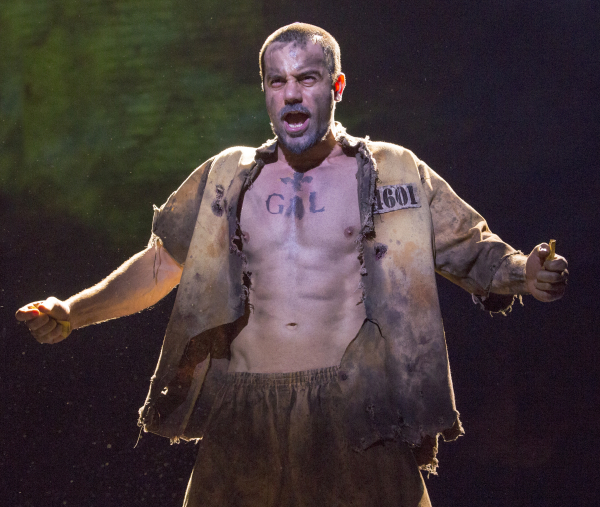Les Misérables

(© Matthew Murphy)
Les Misérables is not just a show; it's an event. The world-famous musical by Claude-Michel Schönberg and Alain Boublil, now returning to its first New York home at the Imperial Theatre in a glorious revival, is an iconic Broadway experience. Not only this, but a three-decade production history, numerous cast recordings, and most recently, the 2012 film starring Hugh Jackman and Anne Hathaway, have made Les Mis an entity that is beloved by millions. From the thunderous applause that greets the opening chords of the Prologue, you know you're in for something special. Les Misérables is high mass for the Broadway faithful.
The story is based on Victor Hugo's 1862 eponymous novel of unconditional love and redemption: The story follows Jean Valjean (Ramin Karimloo), a convict who promptly breaks his parole upon release from a 19-year prison sentence. After a brief fling with recidivism, Valjean turns over a new leaf at the urging of the kindly Bishop of Digne (Adam Monley). Eight years later, Valjean is a wealthy factory owner and mayor of the seaside town Montreuil-sur-Mer. When Valjean's former jailer, Javert (Will Swenson), becomes the town's new police inspector, old memories begin to resurface. Meanwhile, Fantine (Caissie Levy), a worker in his factory, is fired after a foreman learns that she has a child out of wedlock. Forced to turn to prostitution, Fantine becomes ill, and by the time Valjean realizes the injustice done to her, it is too late. Fantine dies, but Valjean vows to protect her daughter, Cosette (Angeli Negron and McKayla Twiggs as a child, Samantha Hill as an adult). They flee to Paris, where Valjean finds his paternal responsibilities increasingly difficult, especially as Cosette becomes infatuated with Marius (Andy Mientus), a young republican student. Following the death of Napoleonic War hero and republican champion General Lamarque, the city is swept up in the inferno of revolution. Flags, bullets, and glory notes fly about the stage at a dizzying pace, culminating in some of the most satisfyingly melodramatic moments to grace a Broadway stage.
Les Mis has taken on a ritualized quality, akin to a religious service at which everyone in the congregation knows when to sit, stand, and kneel (and as if by divine intervention, no one is bored). We await certain moments (the court scene, the confrontation, the barricade) with baited breath. We listen to the hit songs we know so well ("I Dreamed a Dream," "On My Own," "The People's Song") with care and attention. The story is so well-constructed and the score so memorable that a middling performance is not enough to ruin the show, but an exceptional performance is enough to take the show into the realm of the sublime.
Happily, there are plenty of great performances in this revival: Chief among them is Karimloo, who, along with his scruffy facial hair and sleeve of tattoos, embodies a grittier, sexier Valjean. Still, a simple decency and humility undergirds his performance, which sees Valjean transform from an angry young man into a wise, selfless father. Karimloo’s clear and buoyant falsetto rings throughout the theater, turning "Bring Him Home" into a jaw-dropping and unforgettable high prayer.
Swenson plays a supremely conflicted Javert. His rendition of "Stars" is rich and legato, overflowing with dark vowels and darker feelings. Kyle Scatliffe's Enjolras has the wild-eyed passion of a true believer, perfect for the revolutionary leader. Providing much-needed comic relief in this heaviest of heavy musicals, Keala Settle steals the show as Madame Thénardier, the zaftig wife of a con man. Every note and moment is endowed with crystal-clear (and over-the-top) intention, keeping us laughing in disbelief.
The whole show is embellished, but that's how it should be. The hit-and-run scenes are designed to make a quick impression in this mousetrap condensation of a 1,000-plus-page novel, so the performances are necessarily heightened. We never question the moment when Madame Thénardier empties a chamber pot into her husband's wine, because we understand just what an odious ghoul she is from her first five seconds onstage. What does come into question are the moments of stage violence, because they are uniformly awful. It seems like some actors were directed to make their fights abstract (like a dance), while others were pushed toward maximum realism (without proper guidance). Directors Laurence Connor and James Powell should have opted across the board for the former. Since the audience has already accepted the fantastical world of a sung-through musical, Kabuki-like stage combat wouldn’t be a bridge too far.
That's a minor flaw in a generally well-staged show. Matt Kinley's stealthy set proves that Les Mis can be done without the now-legendary turntable with which the show has been long-associated. He facilitates the Shakespearean pace with dark and gothic projections based on Victor Hugo's own paintings. Detailed panoramic scenes of dirty French peasants materialize out of nowhere, like flash mobs of Eugène Delacroix enthusiasts. Andreane Neofitou and Christine Rowland garnish the mise-en-scène with their superbly well-tailored costumes.
This show is the real deal. Even the most cynical of theatergoers will find it difficult not to be carried away by the grandeur and sweeping emotion of the evening. And you really can't ask for much more from a night at the theater.











